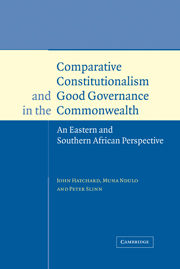 Comparative Constitutionalism and Good Governance in the Commonwealth
Comparative Constitutionalism and Good Governance in the Commonwealth Book contents
- Frontmatter
- Contents
- Preface
- List of cases
- List of constitutions
- List of statutes
- List of other instruments
- Map
- Introduction
- 1 The democratic state in Africa: setting the scene
- 2 Constitutions and the search for a viable political order
- 3 Devising popular and durable national constitutions: the new constitutions of the 1990s
- 4 Perfecting imperfections: amending a constitution
- 5 Presidentialism and restraints upon executive power
- 6 Enhancing access to the political system
- 7 Making legislatures effective
- 8 The judiciary and the protection of constitutional rights
- 9 The devolution of power to local communities
- 10 Developing autochthonous oversight bodies: human rights commissions and offices of the ombudsman
- 11 Seeking constitutional control of the military
- 12 Constitutionalism and emergency powers
- 13 Constitutional governance: the lessons from southern and eastern experience
- Bibliography
- Index
11 - Seeking constitutional control of the military
Published online by Cambridge University Press: 23 June 2009
- Frontmatter
- Contents
- Preface
- List of cases
- List of constitutions
- List of statutes
- List of other instruments
- Map
- Introduction
- 1 The democratic state in Africa: setting the scene
- 2 Constitutions and the search for a viable political order
- 3 Devising popular and durable national constitutions: the new constitutions of the 1990s
- 4 Perfecting imperfections: amending a constitution
- 5 Presidentialism and restraints upon executive power
- 6 Enhancing access to the political system
- 7 Making legislatures effective
- 8 The judiciary and the protection of constitutional rights
- 9 The devolution of power to local communities
- 10 Developing autochthonous oversight bodies: human rights commissions and offices of the ombudsman
- 11 Seeking constitutional control of the military
- 12 Constitutionalism and emergency powers
- 13 Constitutional governance: the lessons from southern and eastern experience
- Bibliography
- Index
Summary
The military should always be kept in subjection to the laws of the country to which it belongs, and he is no friend of the Republic who advocates the contrary.
The relationship between civilian government and the military
The most prized right of any political community is the right to govern itself. It follows that good governance and undue military involvement in the political process are incompatible and that a civilian government must retain supremacy over the military. In essence this means that the military must have sufficient power and autonomy to carry out its constitutional role but that it must not dominate or unduly influence other aspects of governance or enjoy an excessive share of national resources. As the ANC in South Africa declared in its seminal 1992 policy statement Ready to Govern, the security forces should be:
Bound by the principles of civil supremacy and subject to public scrutiny and open debate … [and] be accountable and answerable to the public through a democratically elected parliament.
The principle of ‘civil supremacy’ was also considered by the Sub-Council on Defence and the Joint Military Co-ordinating Council during the 1993 constitutional negotiations in South Africa. In doing so, it noted:
There is a fundamental division between the military and civilian spheres whatever the level of interaction between them. The essence of the division is that armed forces should refrain from involvement in politics other than through constitutionally approved channels whilst civilians refrain from interfering in operational matters, and with the military chain of command and the military discipline code.
- Type
- Chapter
- Information
- Comparative Constitutionalism and Good Governance in the CommonwealthAn Eastern and Southern African Perspective, pp. 240 - 275Publisher: Cambridge University PressPrint publication year: 2004


